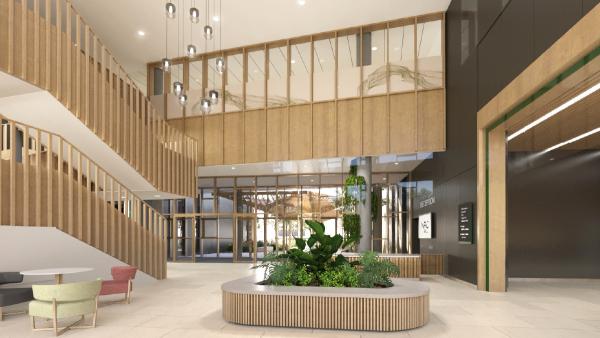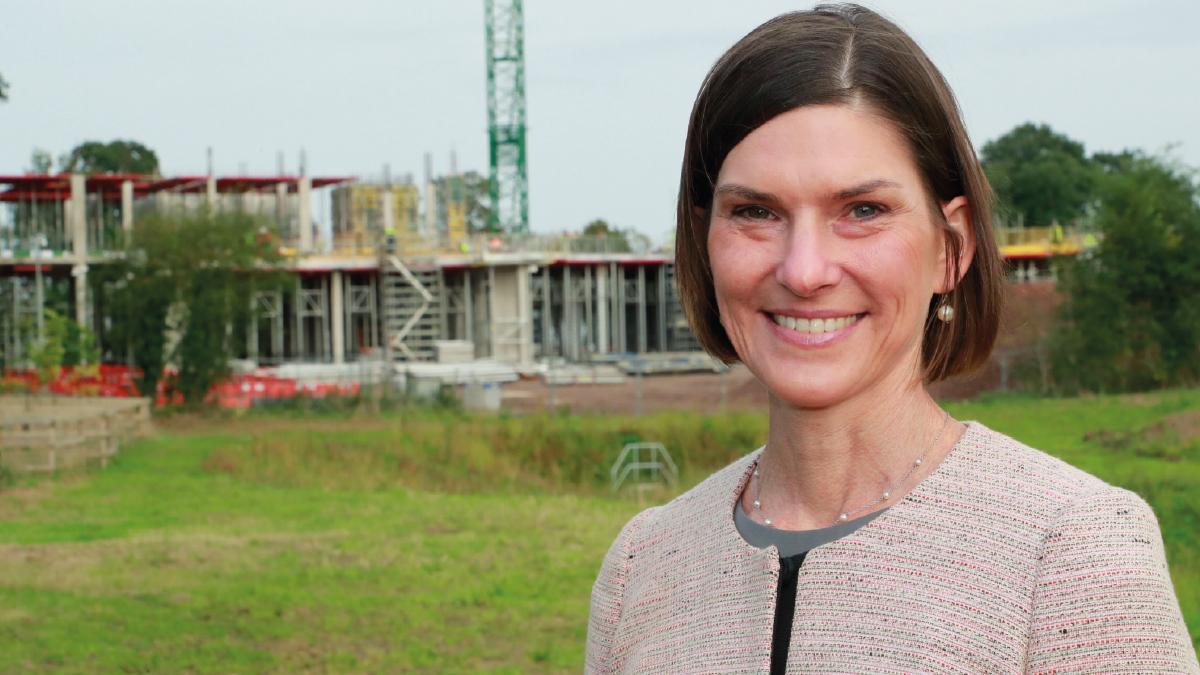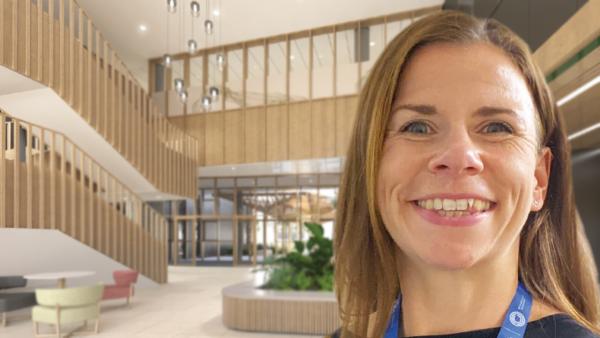For the first time the UK will have a ‘national rehabilitation centre’ promising innovations in treatment and research collaboration. A new training approach for a pioneering role in rehab - rehab assistant practitioners. Gary Henson reports

The NRC’s mission:
To transform outcomes for people who have suffered potentially life-changing injury, trauma or illness. To support patients to return to active employment or a meaningful standard of life through integrating rehabilitation, research and education, and using the latest innovations and interventions.
The National Rehabilitation Centre (NRC) is a joint clinical and academic facility, integrating clinical care, education, research, and innovation under one roof.
Nottingham University Hospitals NHS Trust has partnered with the University of Nottingham and Loughborough University to deliver a national centre of excellence for rehabilitation in the East Midlands.
The NRC programme recently received formal government approval for the £105 million plans and work is now progressing to create the 70-bed, purpose-built new facility, near Loughborough.
The specialist NHS facility will be built on the Stanford Hall Rehabilitation Estate, home to the Defence Medical Rehabilitation Centre which opened in 2018. It aims to be treating patients early in 2025.
The objective has always been to improve outcomes, for both NHS patients and armed forces members alike, by putting the two facilities side by side in a way which enables them to share expertise, advance new treatments, and achieve more together than they could working individually.
Combining patient care, delivered by staff from Nottingham University Hospitals, with research, innovation and training, the centre’s objective is to act as the national hub to transform how people recover and regain fitness and function, following serious injury or illness, and to widen access to rehabilitation beds.
Miriam Duffy, NRC programme director at Nottingham University Hospitals NHS Trust, said: ‘A huge amount of care and research has gone into developing this unique rehabilitation centre to ensure that it will support our patients’ needs.
The National Rehabilitation Centre will transform how we provide clinical rehabilitation. This long overdue centre will push the boundaries of rehabilitation for the next generation and bring real impact in terms of helping people to realise their full potential following injury or illness.
Nick Carver, chair of Nottingham University Hospitals NHS Trust, added: ‘The NRC will be significant both for our patients recovering from life-changing illnesses or injury, as well as for the national and international development of the rehabilitation speciality.’
What’s new for patients
The NRC will initially be a regional rehab unit, available to any patient who needs rehab – open to MSK, neurological and trauma patients and long deconditioned patients – so it will widen out from just condition-specific referrals to include a broad intake of patients.
It will offer an intensive rehab model – around three to four hours a day of rehab as opposed to what is usually offered by the NHS, which is 30-40 mins per day rehab.
It is anticipated the NRC will become a ‘hub’ in a ‘hub and spoke’ model, like major trauma centres in the NHS.
While there has been success in treating trauma, there has been a significant void for rehab after that treatment – and this is where the ambition for the NRC developed, to enable rehabilitation of those treated for major trauma.
Research impact
The NRC will be the national centre of training and education for rehab. It has two academic partners – the University of Nottingham and Loughborough University which will have a co-located presence on the site so they can collaborate closely on research and innovation. The aim is to fast-track patient impact of treatment advances (currently this takes around 10 years).
NRC medical lead Andrew Taylor said: ‘The NRC is a once-in-a-generation opportunity to transform rehabilitation in England and deliver world-leading treatment, research and innovation.
‘I’m particularly excited at the prospect of integrating education, teaching and research with clinical practice – this is something I believe can deliver substantially improved patient outcomes and make the NRC a benchmark of rehabilitation across the world.’
Innovations in training
The centre will offer a foundation degree apprenticeship which will enable students to undertake a rehab assistant practitioner role (band 4 equivalent). This is a new role bespoke to the NRC, aiming to overcome siloed working – they will work across OT, physio and nursing. There previously have been some roles which already exist which cross silos, but never with a comprehensive evidence and training base behind them.
This is a bespoke project which Alison Wildt, service improvement lead, formerly a neuro physio and now in a leadership role at the NRC, has been part of.
The NRC commissioned Birmingham City University to develop the foundation degree apprenticeship bespoke to its needs.
It was developed after a thorough review of models internationally and in the military.
Commenting on the benefits the NRC will provide, Lord Markham, parliamentary undersecretary of state at the Department of Health and Social Care, said: ‘The centre will bring the latest research and training into clinical settings, not only helping people recover and live more independently after serious injury or illness but also freeing up clinician time.’
The NRC will share some specialist facilities with the Defence Medical Rehabilitation Centre, such as the hydrotherapy pool, gait lab and CAREN (Computer Assisted Rehabilitation Environment), which is a high-tech device to help people to learn to walk again.
The rationale for co-locating both the defence facility and the NHS facility side-by-side on the same site is to facilitate sharing of expertise in ways which have never been possible or achieved before.
Under the new arrangement, specialist knowledge and skills – which have been developed by defence medicine due to treating injuries sustained in conflict – will be used to benefit NHS patients. Expertise from NHS clinical leads and practitioners will similarly transfer in the other direction. This sharing concept is at the heart of the proposition and will result in improvement across all aspects of clinical rehabilitation.
The CSP’s view
CSP policy lead Rachel Newton welcomed the new approach and explained what the CSP wants to see more of.

‘Having a national centre of excellence for rehabilitation and associated research will be a big step forward in the drive for the transformation of health care services in a way that puts rehabilitation in a level footing with medicine and surgery.
‘The setting of the new centre offers the possibility of the NHS learning from the armed forces, about the value of prioritisation of rehabilitation and what this looks like in practice.
But, Rachel said, ‘this can only be achieved with increasing staffing levels of rehab services.’
Miriam Duffy – NRC programme director
Miriam Duffy is the NRC’s programme director and has been integral to the project since its conception following the legacy of the 2012 Olympics in London, where there was national recognition of the huge gap in rehabilitation services in England.

She trained as a physiotherapist at King’s College London, qualifying in 1993. Having completed a number of rotational posts it became clear that the field of neurosciences was where Miriam wanted to focus her career. After spending time at the Oxford Neurosurgical Unit, she moved to Nottingham, where the rehabilitation part of her career really took off.
Miriam has always been clear that rehabilitation is a team sport and whilst physiotherapy is integral to that, it is not the whole.
She completed an MBA and has held several leadership positions including director of operations for a large acute teaching trust, then moved into service improvement becoming the clinical lead for the East Midlands Major Trauma Centre.
The fundamentals of her physiotherapy training, such as problem solving, goal orientation and outcome measurement have served her well throughout her working life, and she frequently draws on them in her current role, as director of the NRC programme. In addition, her physiotherapy training has given her a wide range of skills, enabling her to influence, both at an individual patient level during treatment sessions, but also at a system and national level, through transformation programmes of work, such as the NRC.
Rehab assistant practitioner apprenticeship
Combining clinical care, research and innovation, and training and education – the three core elements of the NRC – has led to the creation of the rehab assistant practitioner (AP) apprenticeship. It was borne out of the NRC’s ambition to provide a skills ‘escalator’, offering NHS England aligned training for all clinical roles, to drive the standard of rehabilitation specific training. It was felt that targeting a level 5 apprenticeship initially was particularly important, acknowledging the vital (but often under-recognised) role that APs play in service delivery. Rehab specific masters programmes have also been designed by both academic partners to further develop the skills escalator.
The role of the rehab AP was devised to support and enable the NRC to provide an intensive level of rehabilitation, aligned to international best practice. This model of care requires the rehab APs to work across physiotherapy, occupational therapy and nursing, bringing therapy into every interaction with the patient, thus truly embedding the 24 hour rehab model.
Leading this initiative from the NRC is Alison Wildt, a qualified physiotherapist of 20 years, who has worked in neurological rehabilitation for the majority of that time.

She says: ‘I am very passionate about the rehab AP role as I believe it will be a great facilitator for effective patient centred multi-disciplinary working, in complex rehabilitation. ‘Birmingham City University have been a great team to work with, from the creation of this bespoke course, to now providing on-going support for our first cohort of apprentices, currently in training.’
The team have worked collaboratively with the NRC to design the course content, allowing for the utilisation of the most innovative and contemporary teaching styles and tools. The course modules follow and map the patient rehabilitation journey, meaning that the knowledge and skills that apprentices develop are appropriate to enhance the quality of patient care in any clinical setting, where rehabilitation is provided.
After winning the tender to deliver the rehab AP, things at Birmingham City University have been ‘a whirlwind, but fantastic at the same time,’ Jodie Bryant said.

Now a month into the new programme, Jodie feels incredibly privileged to have been involved in such an innovative and collaborative project.
She said: ‘I have been a qualified physiotherapist for 17 years and a university academic for six, but this project has truly allowed me to bring together my two passions of teaching and rehabilitation.
‘It is fantastic to work so closely with a wonderful group of apprentice learners from four different employers. Every week I watch them develop their knowledge, skills and behaviours in the classroom and then apply, translate and test these in practice.
At Birmingham City University, we are passionately committed to supporting the development of rehab AP apprenticeships to allow for wider access to, and participation in, higher education.’ A second cohort of rehab AP apprenticeships will be recruited early next year.
The CSP’s view: Learning across the sectors
Health and academic partnerships create a synergy between healthcare providers and educational institutions leading to advancements in research, training, education and patient care, said CSP assistant director workforce and education Reena Patel.
‘This collaboration can foster a culture of innovation by encouraging the exchange of ideas, allowing for the application of academic research into real-world healthcare as well as workforce career development opportunities.
‘Co-production across the partnership will be critical to its success.’
Contact details
For course enquiries or details of additional assistant practitioner apprenticeship pathways delivered by Birmingham City University, contact: jodie.bryant@bcu.ac.uk.
Contact NRC: NRC@nuh.nhs.uk for enquiries on the NRC or future recruitment opportunities.
Find Out More
Number of subscribers: 1




































